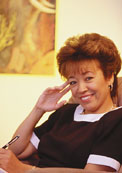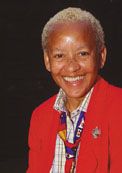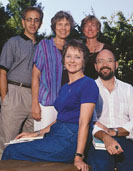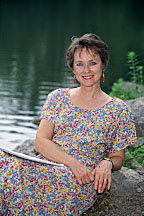
by Jill Elswick

It must be tough being married to a creative writer. You never know when an unflattering glimpse of yourself might turn up in one of your spouse's stories.
Take Virginia Tech English instructor Lisa Norris (forestry '79) and associate professor Ed Falco, for example. Norris and Falco are both married to creative writers--each other. Norris once objected to a harsh portrait of a woman doing leg lifts in one of Falco's stories. Falco, in turn, disliked Norris' characterization of a man with the annoying habit of shaking a peanut jar.
Fortunately for their marriage, Norris and Falco understand fiction's tendency to borrow details from real life. "Writing is just like breathing in our house," says Norris.
Not all members of Virginia Tech's creative writing community are married to each other. But to hear them talk, you'd swear they were from one big, happy family.
"There's a real celebration of each other," says novelist Simone Poirier-Bures, an instructor in Tech's English department. When a new book is out, a party is usually held to honor its author. As Poirier-Bures says, "We all bloom a little when somebody else blooms."
Special friendships have also blossomed in Tech's English department.
 |
Poet and novelist Lucinda Roy, alumni distinguished professor of English, says, "I certainly find it important to have Nikki Giovanni here. It's nice to have another faculty member of color to go to."
Giovanni, the acclaimed poet, encouraged Roy to submit her poetry to feminist press Eighth Mountain's poetry contest. Giovanni bet Roy a bottle of wine that she would win. When Roy won, Giovanni demanded, "Where's my wine?" |
 |
| Lucinda Roy | Nikki Giovanni |
But when Roy's debut novel was published earlier this year, Roy recouped her losses from Giovanni, who wrote a glowing back-cover review and sent Roy two bottles of wine.
Poet Katherine "Bonnie" Soniat and poet Jeff Mann have become poetry trading friends. "A lot of my poems begin as banyan forests," says Mann, "you have to take up a machette."
Mann admits, "It's annoying not to be able to write the perfect poem all by itself," but he is grateful for Soniat's feedback. "Plus, her cat's adorable," he says. "A big, fluffy, orange Persian with one of those flat faces."
The pure, friendly affection these writers have for each other goes beyond dutiful professional respect or admiration. Putting their writing aside, they often get together just for fun. Falco, for example, alternately plays tennis with Soniat and popular crime novelist Carl Bean.
Tech's creative writing courses are extremely popular, although there is no creative writing major, only a minor. At the beginning of each semester, students from across the university--not just English majors--can be seen waiting in the hallways trying to get overrides into creative writing classes that have already been filled to the 21-student limit.
"From the department's point of view," says Johann Norstedt, head of the English department, "creative writing is one of our most successful offerings." But even more important to Norstedt than simply filling classrooms is the program's ability to help students explore, through the strenuous intellectual activity of creative writing, "the possibilities of the human condition."
"It seems to me," says Tech Provost Peggy Meszaros, "that any major university that is serious about developing the mind has a very strong creative writing program." Furthermore, says Meszaros, "We're preparing students for life. If we are only preparing people for that entry-level position, we are not doing our job as a university." The creative writing program's ability to stimulate creativity, Meszaros concludes, is vital to a university that prides itself on innovation and entrepreneurship.
Tech's emphasis on creative thinking is also seen in an experimental interdisciplinary program on creativity, led this fall by architecture professor and Associate Provost Ron Daniel for teachers of Tech's first-year students. "Creativity happens when you get those cross connections," says Daniel. "It doesn't just happen in the vertical slice of what we do."
If creativity and writing are values Tech is developing throughout the university, the creative writing faculty, with their unique approaches to teaching, epitomize these values.
Soniat asks students to draw their feelings in crayon before they write a poem. This fall her advanced poetry students will turn a poem into a design, a song, a painting, or a dance.
In one of her recent advanced poetry courses, Giovanni played "March of Waters," a Portuguese song by the late Antonio Carlos Jobim (his most famous song is "The Girl from Ipanema"). Students listened actively to the song, then translated it into a poem. "No one knew anything about what he was actually saying," says Giovanni, but "everybody got the joy."
 |
Giovanni's classes also have involved mock trials of fairy tale characters. "We charged Little Red Riding Hoodwith the murder of her grandmother," says Giovanni. Cinderella endured a sanity hearing in Giovanni's class. Through the fairy-tale trials, Giovanni's students began to think in new ways about writing and story telling. (Was Cinderella an abused child who created a grand story out of the details of her wretched life to make herself feel better?) |
|
|
Norris' creative writing courses include a service-learning component. Students have the option of performing a community service--spending time with Special Olympics athletes or tutoring at a project in Roanoke, for example--then detailing the experience in a scene and describing how it influenced them as writers. Norris also organizes a panel of Virginia Tech writers with whom her student can consult.
Falco, Giovanni, Roy, and Soniat comprise a first-rate creative writing faculty--by the standards of any college or university. These writers have often had the privilege of seeing their former students have work published in literary journals or gain acceptance into prestigious graduate schools for creative writing. And the faculty members' own writing careers are going strong.
Falco's recent short story collection, Acid, won the Richard Sullivan Prize in Short Fiction. One of its stories, "The Artist," appeared in the 1995 edition of The Best American Short Stories. His second novel, A Dream with Demons (1997), published on compact disc, received a positive front-page review in the American Book Review. To Falco's amazement, the novel has sold 1,000 copies and is being taught at several universities in experimental literature courses.
Falco just completed his latest work, a "multimedia computer narrative project" combining photographs with bits of narration. He's currently working on Cybertown, a novel set in Blacksburg.
Giovanni won this year's NAACP Image Award for Literature for her book, Love Poems (1997), which now has 60,000 copies in print. At the awards ceremony, hosted by Jay Leno and televised on the Fox network, Giovanni read from her poem "But Since You Finally Asked" while Savion Glover of the Broadway play "Bring in Da Noise Bring in Da Funk" tapped to it.
In 1996, Giovanni won the Langston Hughes Award, an honor shared in the past by James Baldwin, Alice Walker, and Maya Angelou. Giovanni's latest project, Grand Fathers, is an anthology which includes writings by some of her former students. The book is scheduled to be published in February 1999. Giovanni has also turned in the first half of a new book which is influenced by environmental concerns, especially the encroachment of humans upon the world's natural habitats.
After seeing her first novel, Lady Moses, published this year to much critical acclaim, Lucinda Roy has finished a second novel, Blood Sisters, scheduled for publication in 2000. Does Roy have ideas for a third novel? "I wish I didn't," she says. Although she had earned recognition for two successful volumes of poetry, Roy switched to writing fiction, she says, "Because the story wouldn't be quiet--it just wanted to be written."
Even while she was spending all her daytime hours writing grants and chairing committees as associate dean for the College of Arts and Sciences, Roy would work every night until 2 a.m. writing the story of a bi-racial woman compelled to explore her identity by travelling in Africa.
Soniat's latest book of poetry, A Shared Life (1993) won the Edwin Ford Piper Poetry Award. Most recently, Soniat won the William Faulkner Prize from the William Faulkner Society of Pirates Alley, New Orleans. Soniat's lyric poetry often considers the way people and their environment are intertwined. She traveled to Peru in July to absorb ideas and impressions for her next book under a Virginia Commission of the Arts fellowship. She has planned her next four books of poetry to focus on "those endangered parts of our landscape--the mountains, the rainforest, the water, and the desert."
Why does such an impressive group of creative writers reside at a university more known for science and technology? "It's a very supportive environment, as far as creative work," says Soniat. Creative writing faculty typically teach two upper level creative writing courses each semester; the rest of their time is spent with research and writing. Soniat also cites the beauty of the Blacksburg area, the low cost of living, and a diverse and bright undergraduate population.
Tech's other English faculty are no slouches either when it comes to creative writing publishing, awards, and honors. Anne Cheney has edited and contributed to Ophelia's Legs and Other Poems, a collection of poems by Blacksburg writers. Professor Tom Gardner has a book of poetry out and publishes in literary magazines, as does instructor Gyorgyi Voros.
Carl Bean's crime novel about a child abduction, Dust to Dust, was published this year. His next novel, With Evil Intent, about a medical experiment using children's internal organs, will be out in December.
Bean is deeply concerned for children in our society, and his brutal novels are meant as a wake-up call about child abuse. He recently received a grant to become the first writer-in-residence at the National Cathedral in Washington, D.C. Bean is currently working on two novels, one on the holocaust and another on a disease that causes children to age prematurely.
Mann recently won the Stonewall Chapbook Competition. As part of the prize, gay and lesbian press Brick House published 1,000 copies of Mann's poetry in a chapbook named Bliss. Mann considers himself more of a "Southern" writer than anything else and often teaches courses for Tech's Appalachian studies program. This fall, Mann is teaching Tech's first English class in gay and lesbian literature, a class filled beyond capacity.
Poirier-Bures' coming-of-age novel, Candyman, has just been approved for use in 10th grade English classes in the province of Nova Scotia. An abridged version of the novel was recently read on Canadian Broadcasting Company Radio, the equivalent of National Public Radio in the United States.
More recently, Poirier-Bures published That Shining Place (1996), a memoir of her stay in Greece as a young woman in the '60s. The book, which Poirier-Bures says is about an "older self coming to terms with a younger, wilder self," won the Evelyn Richardson Award. Poirier-Bures, who has also published 30 short stories and a handful of poems, is currently working on a novel set in Virginia.
Norris has had her Western-flavored short stories published in a number of literary magazines. She is currently circulating a collection of her short stories called Toy Guns, so named because many of the stories deal, she says, with "female hostility."
The influence of Tech's creative writing community doesn't stop at the edge of the Virginia Tech campus. The Blue Ridge Writers Conference, the oldest and largest writers conference in Southwest Virginia, moved to Tech this fall. This year, the English department funded a creative writing outreach program in which Soniat, Mann, and Voros took poetry classes to Pulaski County schools. At the annual "Share Our Strength" hunger-relief benefit (part of a nationwide effort held at Tech on Oct. 29), Tech creative writers read from their works, charging an admission fee that is donated to the Roanoke food bank.
"It's like there's an energy source here," Bean says of Tech's creative writing community. One thing is for certain: Tech's strong creative writing program will be around for a long time and may some day expand into an undergraduate major. "It wouldn't surprise me," says chairman Norstedt, "if in 20 years there were a creative writing major at Virginia Tech."
***************************************************
THOREAU AND ME (ESSAY)

If someone had asked me five years ago if I had ever read Walden, I would have replied, "I must have, but I don't remember." I know, now, that I did indeed read Walden, probably in the 60's while I was in college. But until I reread it three decades later, I had no idea how deeply and importantly Thoreau had influenced my life. I reread Walden in the summer of 1994 because I planned to teach it that fall in an honors freshman composition course. I had begun writing a novel about a couple who moved to the country and try to live more simply; it seemed like a good idea to teach books that would dovetail nicely with my own creative work.
Some months before, I had completed a memoir entitled That Shining Place. The memoir tells of a winter I spent living on the Greek island of Crete in the mid 60's, and a return visit there 25 years later. That time abroad had been my life's big adventure. I was 21. I hitchhiked through Europe, lived in Crete for awhile, then went on to Egypt, Lebanon, Syria, and Jordan. I was gone almost a year. My months in Crete, however, were also my life's great experiment. I lived in a 500-year-old house in Chania's old quarter. A bare bulb hanging from the ceiling in each room supplied light; water flowed into the house for only two hours, a few days a week; a toilet tucked into a lean-to just outside the house flushed when a bucket of water was poured into it. I washed in a basin of cold water; I slept in my sleeping bag on a bare, wooden bench. I was young, brave, and idealistic; I wanted to see how few creature comforts I actually needed, how many I could do without. At night I went to the tavernas and danced with Greek sailors.
The memoir, however, was not on my mind in the summer of 1994; I was thinking of my new novel and what I would be teaching in the fall.
Just before I began rereading Walden, I visited Concord. My husband was attending a conference in Boston, so I took a day to drive out and have a look at Walden Pond. The first thing I saw was the reproduction of Thoreau's cabin with a sign in front that read: "I went to the woods because I wished to live deliberately, to front only the essential facts of life. And see if I could not learn what it had to teach and not, when I came to die, discover that I had not lived." As I read those words, I experienced a sudden, enormous frisson of recognition. I sat in the grass next to the cabin and thumbed through the copy of Walden I had brought along but not yet begun to read, and was astounded at how familiar Thoreau's ideas, even his very words, seemed.
In writing my memoir, I had spent months exploring the psyche of my younger self. "I had already begun to free myself, mostly from the tyranny of things," I wrote. "I had left my four suitcases with the owner of a brasserie in Brussels, my first European stop, and taken with me only a small backpack and a guitar.... I meant to strip life down to its essentials. See what remained." Here was my younger self, all over, in the Thoreau of Walden. I had, in places, echoed his words. I had even included in the memoir a few lists a la Walden: a description of the furniture in my house in Chania, a detailed list of my clothes, the things I bought while I was there. It was astounding: Something had settled in my subconscious and simmered there for years; now here it was, the source.
At first I faced this recognition with some misgivings. Did that make my own "experiment" so many years ago and the writing of it merely derivative? I remembered being influenced by the writings of Kikos Katzanzakis, whom I read voraciously at the time, but I remembered thinking nothing ofThoreau. Yet, clearly, Walden was reflected in both my life in Crete in the mid 60's, and in my writing about it 25 years later. Why did I not remember it?
It occurs to me now that the reason may be found in the climate of the times. In the mid to late 60's, young people were openly and loudly questioning the prevailing values, ardently trying to invent new ones. It was in the air we breathed. There was no escaping it. Perhaps my ideas had come directly from Walden; perhaps they had come indirectly, through other sources. In any case, that day at Walden Pond, I realized that I owed Thoreau an enormous debt.
When I returned home from my trip to Massachusetts and Concord, I found a contract from my publisher for the memoir. This seemed amazingly coincidental.
As I thumbed through my manuscript again, I realized that my own quest was only partly like Thoreau's; I was searching for joy as well as freedom; I was a young woman doing something that few young women at that time did; and I was trying to invent myself through adventure as well as asceticism. The old harbor of Chania, with its wild bazouki music and fierce passions, was a far cry from Concord.
If Thoreau was the impetus behind my own self-discovery when I was 21, my conscious search for freedom, my earnest and ferocious need to invent a self, I felt he could surely be the same for this generation of students as well. Though the 90's are nothing at all like the 60's, the college years are still the time when young people come into their own, questioning parental and societal values, experimenting with various selves. I looked forward to teaching Walden that fall. Among my 13 honors students were two young men with shaved heads, one with a full beard, two with pierced ears, one with a pierced nose. Another had grown up on a commune. The two young women in the class were in the school of engineering, still, at this university, largely populated by males. They would all love Thoreau, I thought.
Wrong. Most of them hated him. "He's whiny and negative." one wrote; "He says the same things over and over." "He's so egotistical and self-important," another said. One suggested that his attitude was dangerous, and if everyone did what Thoreau did the world would fall apart. Others accused him of laziness, self-indulgence. All of them complained about his prose. Only one student defended him; the rest would have run him out of town.
I was shocked by their reaction. Okay, I thought. They're all engineering students. Despite their appearance, they're mostly, at heart, fairly conservative. Maybe I hadn't done a good job of presenting Thoreau. Maybe I needed to prepare students more carefully before reading him.
The next fall, when I tried Walden again, this time with a larger group of regular freshmen, I tried a different approach. I took a line from a Mary Oliver poem and wrote it on the board: "Tell me, what is it you plan to do/ with your one wild and precious life?" "This is the question Thoreau poses," I told them. "He invites us to consider how much of our lives we consciously choose, how much we allow others to choose for us. He asks timeless questions about freedom, about acquisitiveness."
To help my students relate to Thoreau, I asked them to consider, as they read the first few chapters of Walden, what they valued that was not valued by the dominant culture. I invited them to explore what the "necessaries of life" were for them, and to note the times when they felt the most free, the most awake and alive. I asked them whether in their lives they had ever "gone against the grain" as Thoreau had, and if so, what they had gained, and what this had cost them. Lastly, I assured them that, while they might find Thoreau's prose difficult, he rewarded a little effort.
When I read their first reading responses, I encountered some of the same comments as before. "I hate this book," one young woman said. "He's so critical. And he spends forever saying the same old thing or going off on tangents." One wrote: "He's looking for 'meaning.' But I want to be happy. I plan to make lots of money and buy lots of toys to make myself happy." "You have to have a goal in life," another wrote. "Otherwise you're just existing. He doesn't seem to have a goal."
This time, however, a number of students found things to which they could relate. One young woman of Asian descent said Mary Oliver's words haunted her now. She wrote of the difficulties she was having with her parents' expectations of how in Asian families duty to the family comes first, regardless of the desires of the individual. A young man said, "Reading him is like trying to find my way through a blackberry thicket, but I'm glad we're doing it."
Moreover, I discovered that a handful of my students were already "going against the grain" and consciously shaping a self in unconventional ways. They described themselves as "straight edge" -- they neither drank, smoked, nor used drugs. One was also a vegetarian. They all said that being "straight edge" had cost them, -- in popularity, in peer approval -- but they all stuck to their principles. Interestingly, one of the "straight edge" males had bleached blond hair and a pierced ear, a mix of messages I found endearing.
Though some continued to dismiss Thoreau, others changed their minds. He had named something for them -- an awakening reflective self. By the end of the semester, a handful of students designated Walden their favorite of the books we read; an equal number listed it as their least favorite.
I continue to teach Walden now and then, always with mixed results. Some love him, some hate him. It's always difficult. So why bother?
I'd like to believe that Thoreau will affect my students' lives in some of the ways he affected mine. That something will settle there and simmer. That what Thoreau named and identified in them will now be strengthened, that the small, watchful part of their selves will grow instead of diminish. Whether they remember Walden is not important. I think of that girl so long ago in Chania; that younger self who bought her freedom by making do with little. She never knew how it all began.
When I returned to Crete 25 years after my great experiment, I had come to terms with that younger self. I was now middle aged, no longer very brave, a woman who lived in a large, comfortable house, whose idealism had lost its edge. I found that my younger self and I still had much in common, though not in the ways I had imagined. What we share is a certain mindfulness.
The question I posed to my student -- Thoreau's question, via Mary Oliver -- is one I continually ask myself: "What are you doing with your one wild and precious life?" Some days the answer exhilarates me. Some days the answer disappoints. But I continue to ask it. I continue to take stock. I try, periodically, to simplify; try, always, to resist the sucking allure of "things"; try mostly to choose the parts of my life consciously, rather than fall into them by default. This, in the end, is what I hope for, for my students.
As for those months in Chania, they will always shine there in my memory. Even Thoreau abandoned his simple life in the woods. He had other lives to live, he said. And so had I.
*************
Simone Poirier-Bures is the author of two books: Candyman (1994), a novel set in her native Nova Scotia; and That Shining Place (1995), a memoir of a winter sojourn in Crete in the mid 60's. Both books were published by Oberon Press of Canada.
An abridged version of Candyman was broadcast across Canada by CBC Radio dung the first two weeks of September 1997. That Shining Place won the 1996 Evelyn Richardson award for the best work of non-fiction published by a native Nova Scotian.
Carl Bean
1998 Dust to Dust (novel)
1998 With Evil Intent (novel)
Anne Cheney
1984 Lorraine Hansberry (literary biography)
1997 Ophelia's Legs and Other Poems (collection, editor and contributor)
1998 The Burg and Other Poems (poetry)
Edward Falco
1990 Winter in Florida (novel)
1990 Plato at Scratch Daniel's (short stories)
1995 Acid (short stories)
1996 Sea Island (hypertext poetry)
1997 A Dream With Demons (novel)
upcoming Cybertown
Tom Gardner
1992 The Mime, Speaking (poetry)
Nikki Giovanni
1994 Grand Mothers (anthology, editor)
1994 Racisim 101 (essays)
1996 Genie in the Jar (children's poetry)
1997 Love Poems (poetry)
1997 The Selected Poems of Nikki Giovanni (poetry)
1999 Grand Fathers (anthology, editor)
upcoming Shimmy, Shimmy, Shimmy Like My Sister Kate (poetry)
upcoming The Sun Is So Quiet (children's poetry)
Jeffrey Mann
1998 Bliss (poetry)
Lisa Norris
upcoming Toy Guns (short stories)
Simone Poirier-Bures
1994 Candyman (novel)
1995 That Shining Place (memoir)
Lucinda Roy
1988 Wailing the Dead to Sleep (poetry)
1995 The Humming Birds (poetry)
1998 Lady Moses (novel)
2000 Blood Sisters (novel)
Katherine Soniat
1989 Winter Toys (poetry)
1993 A Shared Life (poetry)
unpublished The Landing (poetry)
Back to Features Page
Home | News | Features | Research | Philanthropy | President's Message | Athletics | Alumni | Classnotes | Editor's Page